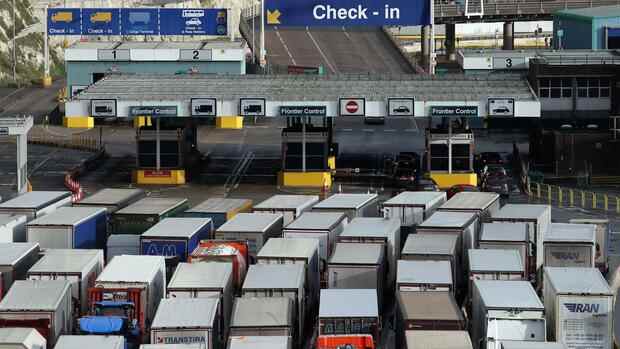Stagnation instead of awakening: German-British trade after Brexit.
(Photo: dpa)
London “We’re getting Brexit over with.” With this rallying cry, British Prime Minister Boris Johnson won the 2019 elections in Great Britain in a political landslide.
The results of the “German British Business Outlook”, a survey conducted by the auditing company KPMG and the British Chamber of Commerce in Germany (BCCG) among 60 German and British companies, show that three years later there is still no question of this.
According to this, 38 percent of the German companies surveyed report falling sales for 2021. Also more than a third are planning further relocations from Great Britain in the next five years. “The absolute low in German-British foreign trade that can now be seen in our survey, contrary to the general trend, is sad proof that our fears were not pessimistic,” said BCCG President Michael Schmidt.
KPMG divisional director Andreas Glunz speaks of a “big shambles for German-British trade”. The trading volume is expected to continue to fall.
Top jobs of the day
Find the best jobs now and
be notified by email.
The negative Brexit effect is illustrated when exports from Great Britain are compared with the global trend. According to the Dutch “World Trade Monitor”, British exports fell by 14 percent in the first three months of the current year, while exports from all other developed economies rose by five percent.
Britain postpones border controls for fourth time
“It was always inevitable that a change in trade relations with the EU would have an impact on trade flows,” Britain’s Chancellor of the Exchequer, Rishi Sunak, conceded this week.
Things are not looking much better for imports from the EU to Great Britain. British media report that the government wants to postpone the introduction of extensive border controls, which was actually planned for July 1, for the fourth time in order not to further exacerbate the existing delivery problems.
“Germany is by far the country in the EU that paid the highest price for Brexit,” said KPMG manager Glunz. At the same time, it is the country that will be hit hardest by the economic consequences of Russia’s war in Ukraine.
Glunz called for a “renegotiation of the trade agreement between Great Britain and the EU” in order to do justice to the new security situation. “Germany has a fundamental interest in putting economic relations with Great Britain back on a solid basis for economic and security reasons,” emphasizes the KPMG expert.
However, the trend is moving in the opposite direction: almost half of the companies surveyed recorded significantly increased costs for administration and logistics in German-British trade. Higher customs duties and increased financing and IT costs are also causing problems for the companies.
This is probably one of the reasons why more than two-thirds of German companies have no concrete investment plans in Great Britain in the next three years. And only four percent want to conquer future markets with British partners. “There can be no question of a departure after the completion of Brexit,” said Glunz.
British experts confirm the sad Brexit balance for the economy. Britain missed much of the recovery in world trade after the pandemic subsided, writes the non-partisan Office for Budget Responsibility (OBR), a kind of audit office. Due to the decreasing trade intensity, the OBR assumes that the volume of exports and imports after Brexit will be 15 percent below the level before the British left the EU.
This also has consequences for the performance of the British economy: The OBR economists expect that the already chronically low productivity of the British economy could fall by four percent in the long term as a result of Brexit.
Economic growth could be affected on a similar scale. The Brexit effect would thus exceed the slump caused by the corona pandemic.
The government is trying to compensate for the setback with new free trade agreements. So far, however, only agreements with Australia, New Zealand and Singapore have been signed. According to the OBR, none of these agreements can compensate for the losses in trade with the EU in any significant way.
Prime Minister Johnson is undeterred by the blow to the British economy and wants to start his campaign for re-election in 2024 in time for the local elections on May 5th. It is quite possible that the slogan will still be “Get Brexit done”.
More: The Russian crisis saved Boris Johnson politically – for the time being


